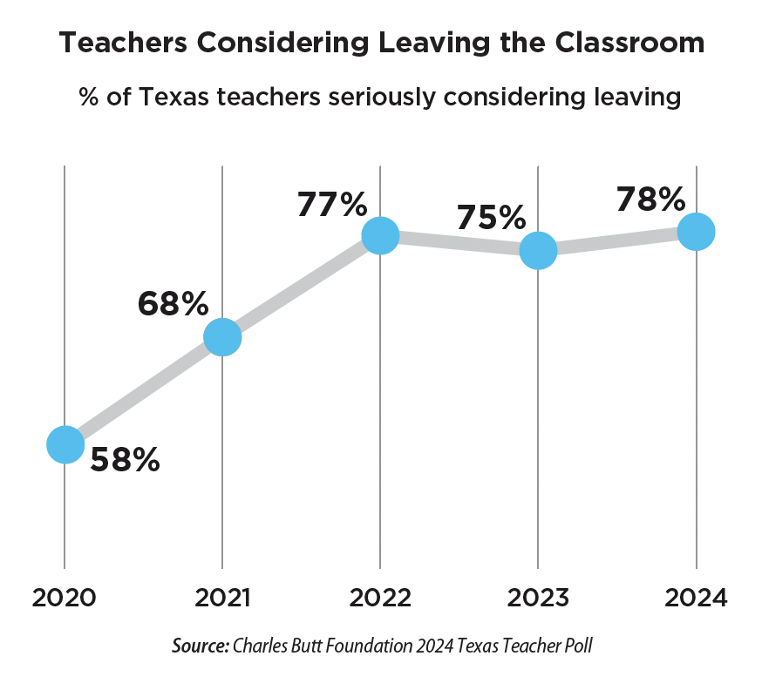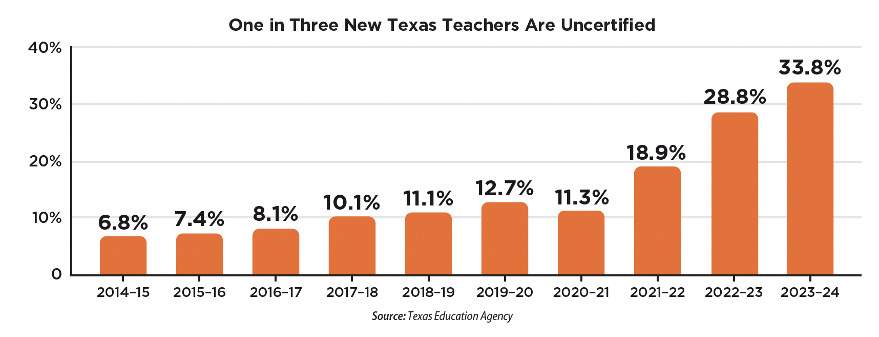
categories
Teacher Raises a Top Priority for 89th Legislative Session

October 10, 2024

The 2024-25 school year is underway, and our Texas public schools are facing a critical challenge: our Texas teachers are underpaid, especially when compared to the national average. This pay gap is not only unfair to our educators but also contributes to teacher shortages, increasing turnover rates, and declining educational quality across the state. With rising living costs and inflation squeezing household budgets, addressing the issue of inadequate teacher pay has never been more urgent for Texas.
Why Teacher Pay is a Critical Issue
There is a significant and persistent gap between Texas teacher salaries and the national average. On average, Texas educators earn over $9,000 less than teachers across the country and 23.4% less than other college graduates in the state. Stagnant cost-of-living adjustments during rising inflation have further reduced teachers’ purchasing power.

The 88th Texas Legislature failed to deliver meaningful pay raises for teachers, leaving Texas teachers to struggle, earning wages that do not reflect the true value or impact of their work. Texas delivers funding to schools based on a complex set of formulas, including the basic allotment. Despite the clear need for action, the basic allotment has remained unchanged since 2019, forcing Texas school districts and their staffs to keep up with rising costs and funding $4,000 less per student in school funding than the national average.
Low pay has also led many teachers to work second jobs, leaving them with less time and energy to focus on students. According to the 2022 Charles Butt Foundation Texas Teacher Poll, 41% of Texas teachers work additional jobs out of financial need outside of their school, in most cases, during the school year.
When our Texas teachers are underpaid and lack adequate resources, it directly impacts the quality of instruction Texas’ 5.5 public school students receive. Teachers ultimately decide to leave the classroom, then teacher turnover issues can disrupt student learning and negatively affects educational outcomes.
According to the newly updated 2024 Charles Butt Foundation Texas Teacher Poll, 78% of Texas teachers are seriously considering leaving the classroom—a 3% increase from 75% in 2023. When teachers leave the profession due to low pay, students lose valuable mentors, and the continuity of their education is compromised. The reliance on uncertified teachers, who may lack the training and experience necessary to provide a high-quality education, further intensifies these issues.

The Real Cost of Being a Texas Teacher
When comparing the average Texas teacher’s salary to other professions requiring similar levels of education and training, the disparities become clear. Many jobs with comparable salaries require far less education and offer more financial stability. The cost of obtaining and maintaining teaching certifications further compounds this issue, making it increasingly difficult for many educators to justify staying in the profession.

Moreover, the mental and emotional toll on teachers is significant. Studies show educators face high levels of stress and burnout, exacerbated by low pay and demanding job expectations. For many, the opportunity cost of choosing to teach over other careers is too great, discouraging talented individuals from entering the profession altogether. Even programs like the Teacher Incentive Allotment (TIA), while beneficial, are not reaching many teachers, leaving many without the financial support they need.
As of 2024, there are 13,774 designated TIA teachers in Texas, a small proportion of the over 350,000 teachers in Texas.
The Impact on Students and Texas’ Future Workforce
The teacher pay crisis has tangible effects, as seen in districts like Socorro and Ysleta near El Paso. Socorro ISD reports 105 vacancies, while Ysleta ISD has 22. These districts rely on substitutes to fill these gaps, with Ysleta ISD prioritizing certified substitutes to maintain classroom quality. However, substitutes cannot replace the consistency and effectiveness of full-time, certified teachers. This situation spotlights the urgent need for competitive salaries to attract and retain qualified educators. High turnover and reliance on substitutes disrupt student learning and threaten educational outcomes.
The consequences of low teacher pay extend beyond individual educators, impacting the entire educational system and, by extension, the future of Texas. High teacher turnover and the increasing reliance on uncertified teachers are alarming trends that threaten the quality of education in our state. As many as one in three recently hired teachers in the 2022-2023 school year were uncertified, with rural districts disproportionately impacted by this trend.

Texas teachers deserve more than just our gratitude—they deserve fair compensation that reflects their vital role in our society. By addressing the issue of teacher pay, we can ensure that our educators are supported, our students receive the quality education they deserve, and our state remains competitive in the future.
The time to act is now. The future of Texas depends on the success of our public schools, and that success begins with properly valuing and compensating our teachers.
Our teacher workforce legislative priorities for the 89th Texas Legislature include supporting teacher retention through increased compensation and benefits packages of at least $15,000, investing in teacher recruitment strategies, and providing meaningful professional development opportunities.
Stay informed and engaged in what is happening across the state by subscribing to our Across the Lawn newsletter. If you are ready to advocate for increased public school funding, contact your Raise Your Hand Texas Regional Advocacy Director.



